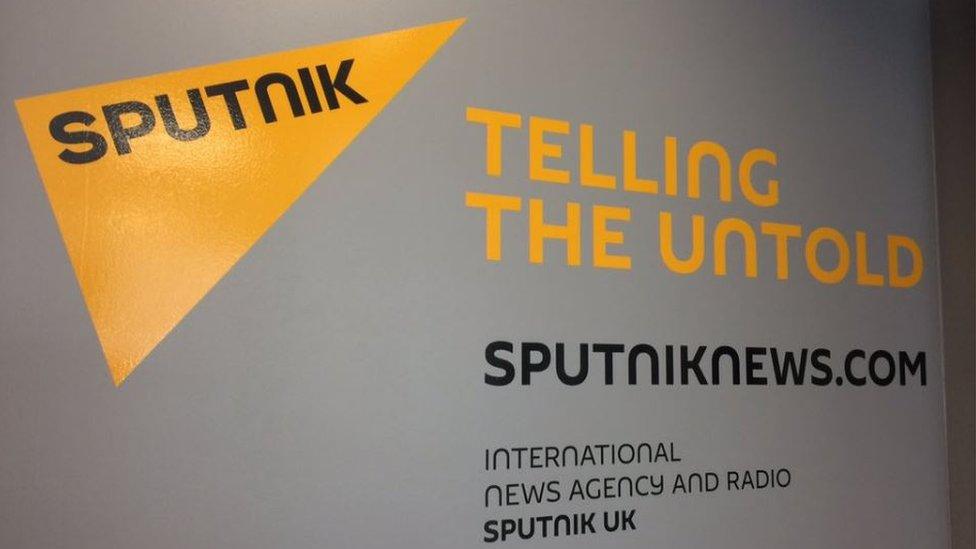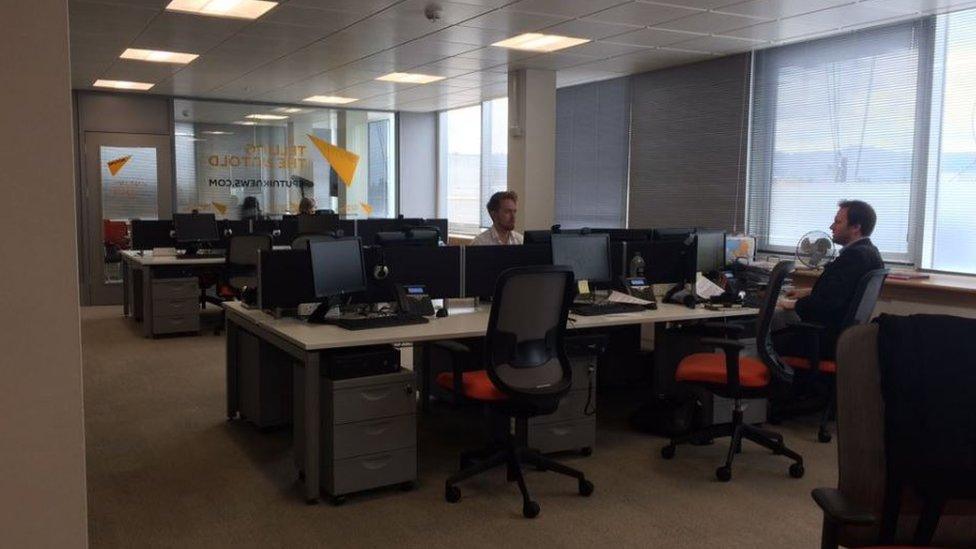Russian news agency Sputnik sets up Scottish studio
- Published

Sputnik has set up a studio in Edinburgh, with a live news programme fronted by Scottish broadcasters
A Russian state-funded news agency has set up a studio in Edinburgh.
Sputnik will broadcast live radio programmes from its base in Scotland, with the goal of "telling the untold" to Scottish and UK audiences.
Critics say the station will act as a mouthpiece for the Kremlin, with an SNP MP voicing fears it could be "a tool for disinformation".
The station's UK editor said he had never come under pressure from Moscow to take a particular editorial line.
Sputnik, which broadcasts online in over 30 languages, is to air a daily news and current affairs programme, World in Focus, anchored by Scottish broadcasters Jack Foster and Carolyn Scott.
Sputnik UK director Nikolai Gorshkov said people in Scotland "deserve to have more news outlets" informing them about "the world at large".
He said: "We're offering people angles on stories and views and backgrounds that they might not necessarily get from anyone else. The days of mainstream media are gone, to a certain extent - there are quite a few rising media start-ups, there's quite a lot of competition and more unorthodox thinking.
"We're trying to give the public what they want - there's a palpable interest on the part of audiences to get other angles and context for them to make up their minds."
'Tool for disinformation'
West Dunbartonshire MP Martin Docherty said he would "urge caution seasoned with a heavy dose of cynicism" regarding state-sponsored broadcasters "that are never reflective of the reality of life in their own nations", particularly with regard to human rights.
He said: "Difficult as it may be for some, the reality in Russia today is the potential prison sentence that awaits anyone expressing a belief in independence from the Russian Federation and that you won't see much of an examination into how Russia's LGBTI community is treated on a daily basis.
"I remain to be convinced that Sputnik will ever be a tool for dialogue, it seems more are a tool for disinformation."

The news agency has set up offices in Edinburgh
Dr Aman Cheskin, a specialist in East European Studies at Glasgow University, said Sputnik was a "state-sponsored initiative" to "support a clear Kremlin line".
He said: "It's all part of the general Kremlin message, the 'information war' some people call it. They certainly put a lot of resources into this.
"Sputnik is designed specifically for a non-Russian audience, and it's to try to convince these people that Russia is not the enemy. It's to say that what you hear in the Western media is not what you should believe. In many respects it's an investment in Russian prestige.
"President Putin will use what he can at his disposal, whether it's tanks or TV and radio stations and the internet. It makes sense for him to use media to support his political programme, both domestically and internationally."
'Editorial independence'
However, Mr Gorshkov said it was "not at all fair" to say the station was a mouthpiece for the Kremlin. He argued that Sputnik UK is only indirectly funded by the Russian state, raising its budget by selling content back to Sputnik International.
He said: "Where the money comes from does not really matter, as long as you are free to maintain editorial independence, and in my two years with Sputnik International I have never had a single incident where anyone from the funding side tried to tell me what to do.
"Russia does have a view of the world, obviously - there are angles and viewpoints and context that is available in Russia, but Russia sees that in the world it is not as widely known as say mainstream Western media or Western governments' viewpoints and angles.
"Russia like any other country is entitled to its viewpoint, and a Russian news outlet - although we strive to be an international, globalist news outlet - we see a void here, that the world does not know much about other viewpoints.
"Our service is to present the public with a view they might not otherwise get. We are trying to present a wider picture to the audience. We are trying to fill a void where there's a legitimate chunk of information that's available to Russia or Russian news outlets which was not widely available to the outside world."